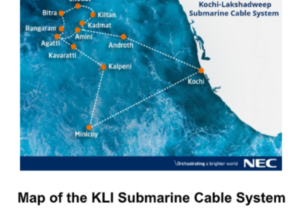System spans approximately 1,870 kilometers, ensuring digital connectivity to the remote islands, giving a boost to its economic and social life
NEC Corporation India (NEC India) together with NEC Corporation today announced the successful completion of a flagship optical submarine cable system in Southern India connecting Kochi and the Lakshadweep Islands.
The Kochi-Lakshadweep Islands Submarine Cable (KLI), developed under the Government of India’s ‘Digital India’ Mission, was inaugurated recently by Prime Minister Shri Narendra Modi. During a speech commemorating India’s 74th Independence Day in 2020, he unveiled the initiative to link the Lakshadweep Islands with a submarine optical fiber cable within 1,000 days. Funded by the Universal Services Obligation Fund (USOF) under the Department of Telecommunications, Government of India, the project was executed by Bharat Sanchar Nigam Limited (BSNL), a telecommunications company under the ownership of the Government of India.
NEC India was awarded with this project by BSNL in September 2021, completing it ahead of schedule in June 2023. Spanning approximately 1,870 kilometers, the system offers an initial capacity of 2×100 Gbps, expandable up to 1,600 Gbps per fibre pair.
The system connects Kochi, a major port city in India, with 11 Lakshadweep islands: Agatti, Androth, Amini, Bangaram, Bitra, Chetlat, Kadmat, Kavaratti, Kiltan, Kalpeni, and Minicoy. Providing ample bandwidth for voice and data connectivity, the cable supports e-governance initiatives, facilitates new enterprises, and enables e-commerce facilities. Aligned with the Digital India Mission, it aids knowledge sharing in educational institutes and ensures electronic access to Government services for citizens.
Aalok Kumar, Corporate Officer & Senior VP – Head of the Global Smart City Business at NEC Corporation, and President & CEO of NEC Corporation India, said, “The successful completion of the KLI cable project, our second venture with BSNL, marks a pivotal moment in NEC’s collaboration with the Government of India towards building a connected nation. This initiative not only puts Lakshadweep on the digital map, it also galvanises socio-economic growth of the region. With a forward-looking data capacity and a focus on connecting people globally, we’re proud to facilitate comprehensive internet connectivity for the islands, aligning with the Digital India Mission and fostering opportunities in e-governance and digital empowerment across the region.”
“Following the successful completion of an optical submarine cable system connecting Chennai, India and the Andaman & Nicobar Islands (A&N Islands) in December 2020, NEC is honoured to yet again take part in this prestigious project which we hope will open a wide range of opportunities for the people on the Lakshadweep Islands,” said Atsushi Kuwahara, Managing Director, Submarine Network Division, NEC. “We would also like to thank USOF (DOT), BSNL, the Indian government agencies and especially the people of the Lakshadweep Islands for welcoming this project and helping to bring it to completion,” he added.
The KLI project exemplifies NEC’s dedication to connecting the unconnected and empowering communities through cutting-edge technology. NEC has been a leading global vendor in the submarine cable system business for over 60 years, manufacturing submarine cables, submarine repeaters, and terminal station equipment, in addition to coordinating marine surveys and route design, equipment installation work, cable laying, training, and delivery testing. Until recently, NEC had procured submarine cable-laying ships for each project separately. In order to respond to the growing demand for new submarine cables due to the recent spread of 5G and the increase in data traffic between data centres in various countries, NEC has chartered a long-term dedicated cable-laying ship for the first time. As a result, NEC will provide submarine cable systems more quickly and flexibly than ever before to meet customer demand.










